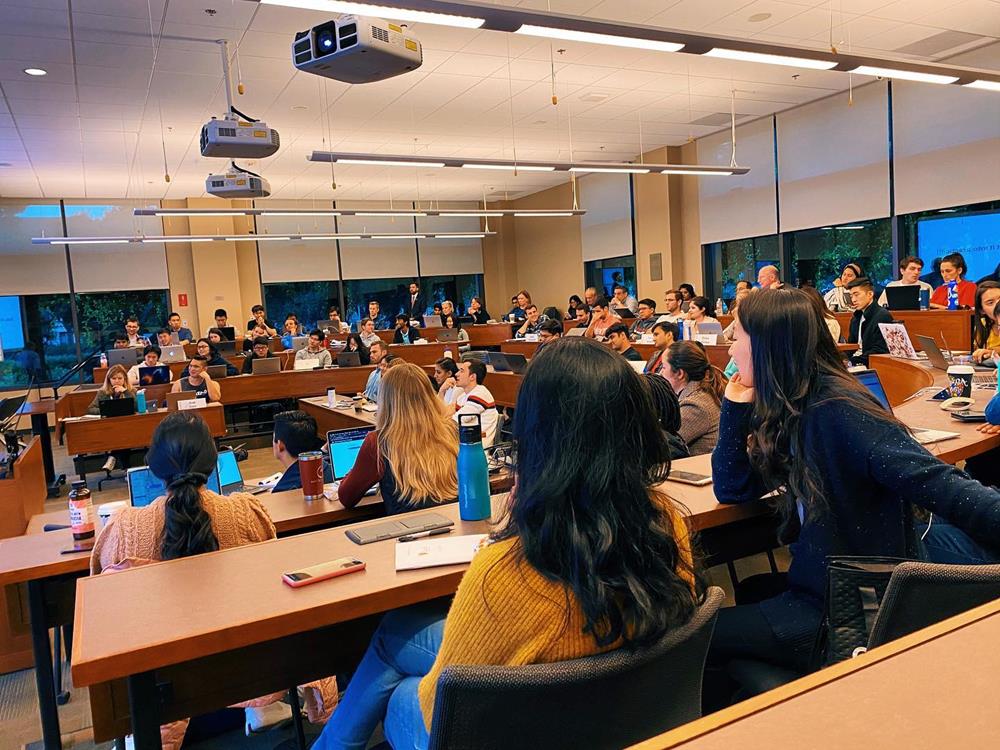How Texas Tech Hubs Are Leading Online Innovation

Texas Tech's Innovation Hub has evolved into a robust digital ecosystem supporting dozens of startups annually through virtual workshops, remote mentorship, and online customer discovery. You'll find NSF I-Corps programs guiding over 200 teams since 2017, with entrepreneurs leveraging XR technologies and virtual platforms to transform healthcare and other industries.
The hub's digital approach has helped startups raise tens of millions of dollars and create hundreds of jobs. Discover how this model is reshaping regional economies statewide.
The Digital Ecosystem of Texas Tech's Innovation Hub
https://www.youtube.com/watch?v=LALRT5bvUC4
Since its inception in late 2015, the Innovation Hub at Texas Tech has grown into an extensive digital ecosystem that serves as the university's premier incubator and accelerator facility. You'll find a dynamic environment hosting dozens of startup teams annually, with spaces designed for collaboration, laboratory work, and business development.
The Hub's digital communications platforms connect students, faculty, alumni, and entrepreneurs, centralizing resources to foster collaboration. Through virtual training workshops, participants gain entrepreneurial skills recognized with digital certification badges. The mentorship program has been instrumental in guiding I-Corps startups through their development journey since 2017.
This online infrastructure anchors the planned Innovation District in Lubbock, expanding the ecosystem's reach while providing year-round access to seminars and events. The Hub's digital presence has become instrumental in positioning West Texas competitively in the knowledge-based economy.
Life Sciences Startups Transforming the Virtual Landscape
While digital innovation transforms industries worldwide, Texas Tech's life sciences startups are pioneering a virtual push in healthcare and biotechnology. You'll find companies leveraging extended reality (XR) to develop remote patient-support tools and digital training within the One Health Incubator facility.
This virtual momentum isn't happening in isolation. With Texas' life sciences workforce expanding in recent years and venture funding on the rise, you're seeing an ecosystem primed for breakthroughs. Startups use VR/AR for simulation and access rapid prototyping resources for faster iteration. Founders can connect with the Innovation Hub team for additional support and resources through listed channels.
When you explore Texas Tech's innovation hubs, you'll see how these digital platforms accelerate research collaboration and commercialization pathways, changing how healthcare solutions reach patients.
Leveraging NSF I-Corps for Remote Customer Discovery

The NSF I-Corps program has reshaped how Texas Tech entrepreneurs validate their innovations without geographic limits. By implementing adaptive online curricula within the Lean LaunchPad methodology, you'll conduct 20–30 customer interviews remotely to test hypotheses and uncover genuine pain points.
Blended learning models combine scheduled virtual sessions with self-paced modules, enabling you to:
- Prepare targeted interview questions that extract meaningful market insights
- Connect with geographically diverse customers across industries
- Analyze qualitative feedback to refine your value proposition
This remote discovery process positions you for SBIR/STTR opportunities and strengthens your entrepreneurial mindset. Success in regional I-Corps programs can recommend teams for national awards, accelerating the path to commercialization.
Virtual Mentorship Networks Driving Entrepreneurial Success
View this post on Instagram
Connecting innovators with experienced guides, Texas Tech's virtual mentorship networks have become essential engines for entrepreneurial growth across the state. The Innovate Texas Tech Mentor Program (iTTU) sits at the center with a vetted mentor bench providing expertise in startup tactics, sales, and specialized engineering fields.
These diversity-focused mentorship circles pair small cohorts with multiple mentors, creating supportive communities while facilitating global exchange among participants from varied backgrounds. Following the MIT VMS methodology, mentors contribute substantial volunteer hours through individualized guidance and open office hours. Program administrators track qualitative outcomes alongside quantitative metrics to understand mentorship impact.
Success is measured through career progress, skill acquisition, and increased professional confidence. Ongoing survey data continually refines these virtual programs, addressing barriers like tenure processes and work-life integration for new faculty and entrepreneurs.
Funding Pathways for Tech-Based Ventures in the Digital Age
Securing appropriate funding remains a critical challenge for technology entrepreneurs. At Texas Tech, you'll find multiple pathways designed for digital innovation—from a Prototype Fund for MVP development to faculty seed support bridging discovery to commercialization.
The microgrant application flow connects you with tiers that fit your stage:
- $5,000–$25,000 prototype development funds for teams with validated insights
- Up to $10,000 faculty innovation support for market-shaping technologies
- Seed microgrants for STEM initiatives with commercial potential
Calls for prototype funding open on posted timelines for eligible entrepreneurs with established ventures. Virtual Demo Day events now showcase these funded startups to scores of mentors and investors, creating a digital pipeline from concept to market.
Cross-State Collaboration Through Online Incubator Programs
While traditional ecosystems are often constrained by geography, Texas Tech's digital incubators turn state lines into gateways for collaboration. You'll find Hub Camp virtual sessions connecting entrepreneurs across regions via Zoom, offering remote networking without travel. Hub Camp is open to the public, making it an inclusive resource.
The nine-month incubator, developed with Innosphere Ventures, supports startups by connecting them to resources across multiple states. This cross-state engagement has proved valuable—startups have secured significant outside investment and created hundreds of jobs through expanded networks.
When you join these virtual programs, you access tens of thousands of hours of mentor time from industry experts beyond Texas, allowing your innovation to scale faster through interdisciplinary knowledge exchange and wider investor exposure.
Measuring Impact: Jobs and Capital in the Digital Economy
Several indicators reveal Texas Tech hubs' digital-economy impact across the state. With tech employment comprising a meaningful share of the Texas workforce and contributing materially to state GDP, you're witnessing sustained transformation.
Data infrastructure and cloud services support large direct and indirect employment statewide. North Texas and other fast-growing regions are projected to expand their tech workforce shares, reflecting ongoing market strength.
Productivity gains from AI and emerging technologies create multipliers that benefit regions beyond immediate tech employment:
- Texas supports substantial data-center and cloud operations, underpinning thousands of jobs
- Major tech investments—from EV to semiconductor supply chains—stimulate regional growth
- Innovation diffusion from defense and computing elevates wages and living standards across hub regions
Regional Economic Transformation Through Digital Innovation
Texas Tech's innovation hubs serve as catalysts, expanding beyond job counts to reshape regional economies. Through digital transformation initiatives aligned with federal innovation policy (including the CHIPS and regional tech-hub strategies), these programs are building globally competitive innovation regions over the next decade.
Comprehensive ecosystem support takes startups from ideation to market entry, backed by strong outcomes—millions raised and hundreds of new jobs. Expert mentorship hours and curated accelerators speed this transformation. Early-stage teams can receive non-dilutive support through competitive accelerator and prototype programs.
Community engagement through member groups and endowed funds supports sustainability, while NSF I-Corps pathways provide critical commercialization routes for deep technologies that address regional needs.
Conclusion
You're witnessing a digital transformation across Texas tech hubs that's redefining innovation. By connecting with virtual mentorship networks, leveraging online discovery tools, and tapping cross-state collaborations, you'll find unprecedented opportunities to grow your venture.
As these digital ecosystems expand, you're positioned to contribute to Texas' economic evolution while accessing capital and resources that weren't possible before the online revolution.




